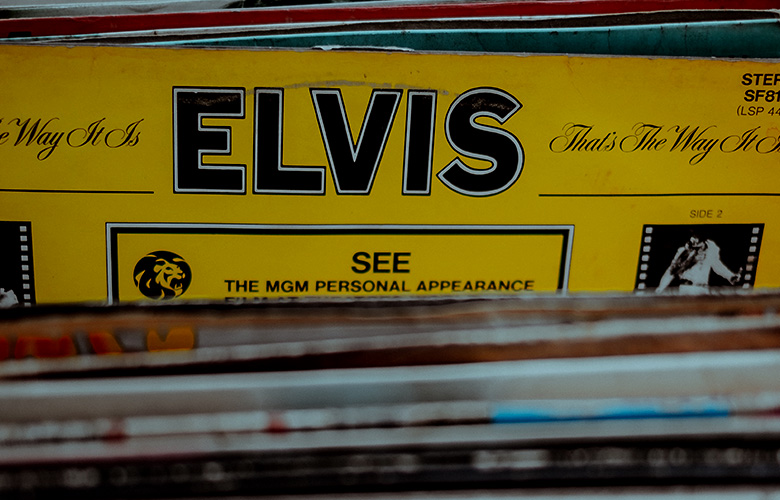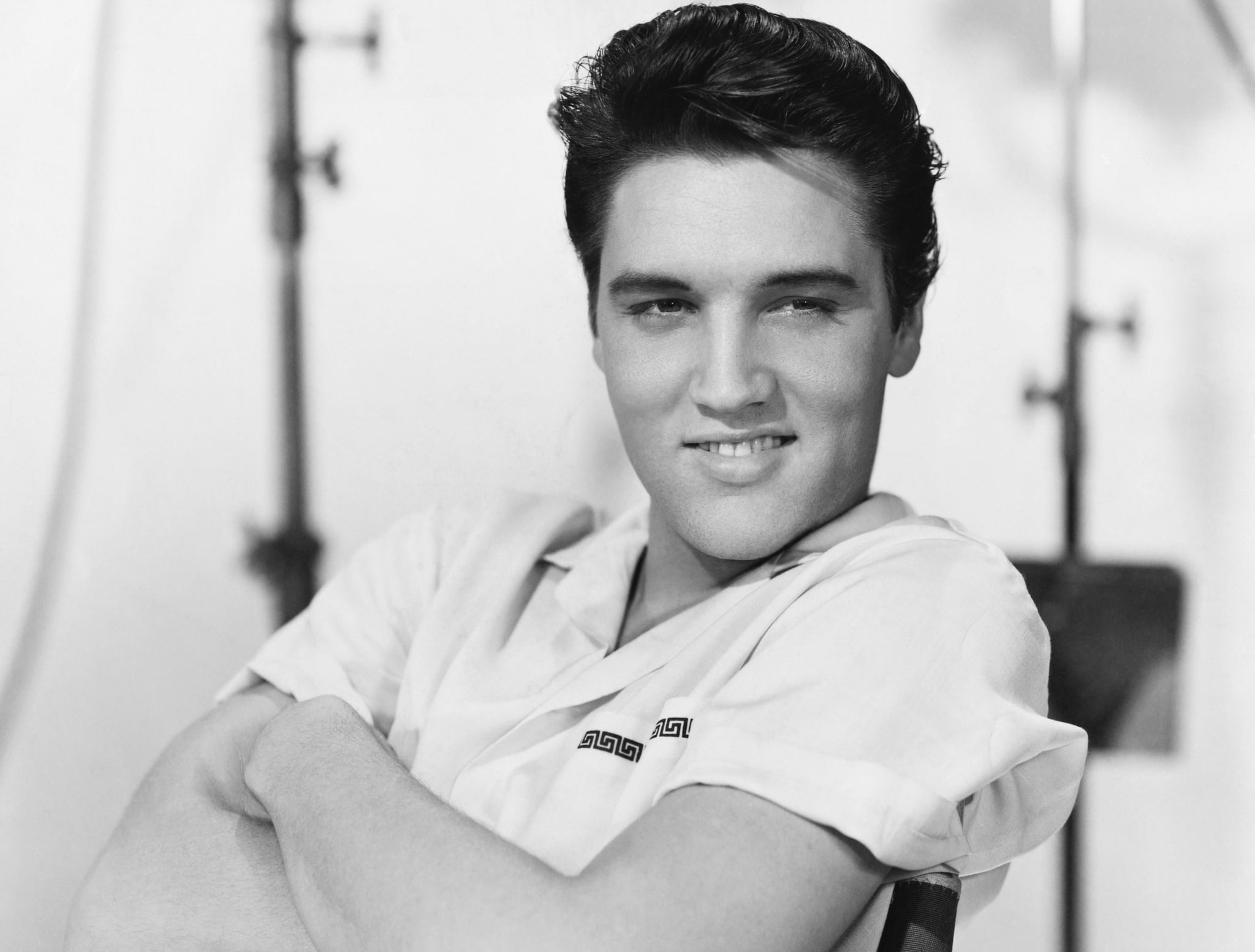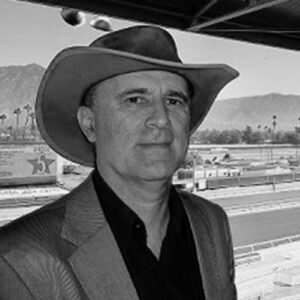
This article was originally published in the Jan-Feb 2019 print edition of Quadrant magazine.
From shotgun shack to Graceland mansion. From driving a truck to flying in his own jet. From singing in a country church to performing for one billion people. The only recording artist to sell a billion records. The American who Leonard Bernstein proclaimed as “the greatest cultural force in the twentieth century. He introduced the beat to everything—music, language, clothes—it’s a whole new social revolution.” The world’s most popular and influential entertainer: Elvis Aaron Presley.
Presley remains—forty-two years after his death and eighty-four years after his birth—an icon. Each year 600,000 fans visit Graceland and many new CDs of his music are released. Presley biographer Peter Guralnick reports that the recording company RCA “would discover that Elvis was as great a sales phenomenon in death as in life”. Elvis Presley Enterprises in 2017 earned $35 million, making it the fourth-highest-earning estate of a deceased star.
A 2009 CBS News Poll found that Presley’s popularity had not dropped in the previous ten years and that 42 per cent of Americans describe themselves as Elvis fans. A 2012 ABC News Poll found that “38 per cent of Americans name Elvis Presley as the greatest rock ’n’ roll star ever. Of the 128 performers named, no one else even breaks single digits.”
Great entertainment stars, in fact all iconic men and women, are unique personifications of core values and virtues. If John Wayne symbolises rugged independence, Errol Flynn roguish charm, Marilyn Monroe innocence, what does Elvis Presley represent? Elvis Presley is the symbol of youth, or more exactly, modern American youth.
Each of us is born into a historical context, a specific place and time embodied by certain values, virtues and beliefs. Elvis was born into a poor family in America’s South in 1935 and exploded into fame some twenty years later. During his formative years, Presley was influenced by his devoted parents, who taught their only child to have good manners, to be optimistic, to dream. The young Elvis attended church, where he began his lifelong yearning for mystical answers to the meaning of life. He grew up beside radios and jukeboxes, absorbing the rhythms and beats of American blues, rhythm and blues, gospel, pop and country music. He breathed in post-war America, a time of great comic-book adventures, celebrated war heroes, movie stars whose exploits conquered all frontiers, and in his later home town of Memphis, of flamboyantly dressed black singers belting out the blues on Beale Street.
In America the 1950s was a time of overt peace (despite the Cold War) and robust economic growth. The resulting prosperity generally gave Americans leisure time, and more specifically, for the first time teenagers became a cultural and economic force: they had money, set trends, and were to become stars.
In this historical context—this creative cauldron of freedom, prosperity and opportunity— rock’n’roll was created, first (though this is disputed by some) by black artists like Fats Domino and Ike Turner for their black audiences, and then by artists of all colours for all kids. Rock’n’roll was colourblind.
It was through rock ’n’ roll that American teens could separate themselves from their parents and forge their own identity. The phenomenon of the teen rebel was born and these rebels searched for someone who represented them. Every rebellion needs a hero. Every movement creates a symbol. The first 1950s teen “rebels” were American, and the meaning of America reveals the nature of these rebels and the meaning of the man who would become their hero.
The French are chic, as expressed in their beautiful fashion sense and language; the Spanish are passionate, as displayed in their flamenco dancing; the English have bulldog grit, as symbolised in Winston Churchill’s grim visage and determined opposition to Nazism.
What then are the dominant traits of Americans? To be an American means: innocent, optimistic, benevolent, confident, independent, enterprising and can-do. To expand on just one core American trait, benevolence: Americans (particularly in times past) believe that they can find meaning and happiness in life, that they can make their dreams come true. The cheery hopefulness, confidence and sense of wonder about life that animate American children are famous worldwide. The infusion of these values makes American youth the quintessential youth and the best representative of the spirit of America.
To whose standard could these benevolent 1950s American rebels look? There were popular candidates. Marlon Brando in The Wild One is asked, “What are you rebelling against, Johnny?” He replies, “Whaddaya got?” Brando was too negative for broad appeal to Americans. Ditto James Dean, whose cool was that of an outsider torn by angst and failure.
The question was answered on January 27, 1956. Released on this day, “Heartbreak Hotel” was a declaration of youth independence. A few rare individuals in every period integrate, express and add to the values of their time and place in a unique way and become symbols of that time.
Let’s look more carefully at the American values that underpin Elvis’s nature and appeal.
Elvis was an independent artist who created art by his own standards and vision. He sang his way (the high-pitched country whine). He dressed his way (the gold lamé suit). He danced his way (the thrusting, sliding, gyrating). He created music his way, such as his revolutionary interpretation of “That’s All Right”. He integrated American music forces—hillbilly, gospel, rhythm and blues—his way. His persona was a dramatic new paradox: one side of him the infamous upturned lip, the wild concert performances burning with a raw sexuality of voice and body; somehow co-existing in the same person with the Momma’s boy, the Southern charm and politeness, the boy on a pew. Elvis was all-American but in a new artistic integration, as if he had joined different aspects of the country: worldly success and spiritual yearning, white and black musical traditions, all fused into a new man that was his own creation.
From an early age, Presley dreamed big and pursued achievement and the skills needed to attain it. “I read comic books and I was the hero of the comic book. I saw movies and I was the hero in the movie.” Elvis was inspired by the comic book hero Captain Marvel, by movie stars Tony Curtis and James Dean. He listened incessantly to music, learning from Mario Lanza (opera), Arthur Crudup (blues), Mahalia Jackson (gospel), Hank Snow (country), Dean Martin (pop) and others. Presley endlessly practised his guitar and singing, cornering friends in a school yard or on a river bank to play to them. People were amazed at how many songs he knew. He once declared, “Ambition is a dream with a V8 engine.” And he also stated, “I don’t regard money or position as important. But I can never forget the longing to be someone. I guess if you are poor, you always think bigger.”
Presley’s aura of benevolence—that success and happiness are the rule—was vividly clear in his much derided but revealing films of the early 1960s. In hit movie after hit movie, Presley played the archetypal young American: good-looking, happy and charming, enjoying life and simple adventures in a world where all great issues have been resolved and tragedy banished. Elvis’s rise from humble beginnings is a classic American tale that speaks profoundly of the benevolence of the American dream: success is possible for everyone. The Guardian reported that “In the late 50s, Elvis was fond of claiming that the US government had [discussed] a visit to Graceland by [then Soviet Premier] Nikita Khrushchev, ‘to see how in America a fellow can start out with nothing and, you know, make good’.”
Although a “rebel”, Presley was the product of an optimistic, positive and this-worldly America, whose people generally saw life guiltlessly, with honest, cheerful openness. While Presley may have riled preachers and editorialists across the nation with his wild stage antics and rebel persona, to rational observers he represented, not rampant satanic hedonism, but a teenage desire for fun. His on-stage sexuality was innocent, honest self-expression and a healthy contrast to the sexual repression of earlier times.
Part of the American legend is the American as the independent, self-assured pioneer creating a new world. America has produced many such great men—Jefferson, Rockefeller, Edison, De Mille, Disney. Underpinning their reshaping of the American political, business and arts landscape was Mount Rushmore-sized confidence, talent and efficacy.

As a modern entertainer, Presley is the purest form of American talent and skill. In the recording studio, he arranged songs into interpretations that set trends to the present day. He perfected rock’n’roll. When the opera star Kiri Te Kanawa was asked who had the greatest voice she’d ever heard, she answered, “The young Elvis Presley, without any doubt.” Another opera star, Placido Domingo, declared, “His was the one voice I wish to have had, of all those emanating from singers in the popular music field.” One of Elvis’s songwriters, Jerry Leiber (the lyricist of the Leiber & Stoller team) stated:
He had an incredible, attractive instrument that worked in many registers; he could falsetto like Little Richard, his equipment was outstanding, his ear uncanny, and his sense of timing second to none.
Elvis’s American virtues were on their most explosive display on stage. His 1968 career-saving Comeback Special showcased Presley as the uber modern American male. The television show’s director Steve Binder described him:
You stop, whether you’re male or female, to look at him. He was that good looking. And if you never knew he was a superstar, it wouldn’t make any difference; if he’d walked in the room, you’d know somebody special was in your presence.
During the special’s live concert segments, on a small stage in the round, dressed in black leather and surrounded by staring or screaming pretty women, Presley gave the performances of his life. Prowling the stage like a panther, lithe and masculine, Presley glowed with confidence and purpose. He sang—ranging from the pleading “Lawdy Miss Clawdy” to the burning “Heartbreak Hotel” to the soulful “Memories”—as if releasing his deepest feelings, and it was as if the audience could express its own deepest passions only through him. Here was a generation’s face, body and voice, its spirit of life as life was surely meant to be: beautiful, free, passionate, great. It was this value affinity between artist and audience that made Presley the most popular entertainer of modern times.
On that stage, more than anywhere else, Elvis Presley revealed himself and his meaning. He sang as if he were alive in the purest form. No fear, no doubt, no repression, no compromise. Here was the performer—laughing, strutting, smiling, kneeling, arms swung wide, head flung back—who embodied raw, passionate life. Here was the man who, above all other modern entertainers, represented the beauty and greatness of America.
What was to befall this American ideal after 1969 is another story, with a different meaning, but we should not forget his inspiring early life and his many gifts to us, which demand that we appreciate that an end does not always invalidate a beginning—and demand that we should know and celebrate the values and virtues of the youthful Elvis Aaron Presley. They are the best within us.
See Scott’s LinkedIn Profile
How to Make it as a Writer: Tips from A Pro
Playwrights and Screenwriters: How to Be New in Your Story


Scott McConnell is a Melbourne-based writer/story consultant who has worked as a documentary producer in Los Angeles, a freelance writer and interviewer and in fiction development. He loves nothing more than working on story. Scott started in the business as a story analyst in Los Angeles; analyzing scripts for Roger and Julie Corman, Samuel Goldwyn and the Sundance Institute, among others. He was later the showrunner (writer/producer/director) of the U.S. nationally syndicated Live Life and Win! and he co-wrote the reality series Hollywood Boot Camp. He has organized stories/shoots all over the world, managing producers, crew and talent, and produced at live events and on re-creation shows. He has found the story by studying footage, reading scripts/books, pre-interviewing talents, shooting BTS, and writing or editing the script. Scott can edit low budget features as well as big budget blockbusters. He loves to fix stories, supply solutions, especially regarding your idea/premise, which is where most films/scripts fail. He also finds that many good writers don't focus enough on theme. It is through theme that a writer moves and audience emotionally. Scott’s story analysis, film reviews and interviews have been published in the U.S., UK and Australia, He has been published in Creative Screenwriting, MovieMaker Magazine, Script, Soundtrack.net, Produced By, The Guardian, Inside Film and FilmInk. Now based in Melbourne, Scott especially focuses on script fixing for individual writers and production companies. Scott is a member of the Producer’s Guild of America. For credits and experience, see: http://www.imdb.com/name/nm3130957/ Contact: Scott McConnell, Melbourne, scottm100@gmail.com
Read Full Profile© 2021 TheatreArtLife. All rights reserved.

Thank you so much for reading, but you have now reached your free article limit for this month.
Our contributors are currently writing more articles for you to enjoy.
To keep reading, all you have to do is become a subscriber and then you can read unlimited articles anytime.
Your investment will help us continue to ignite connections across the globe in live entertainment and build this community for industry professionals.